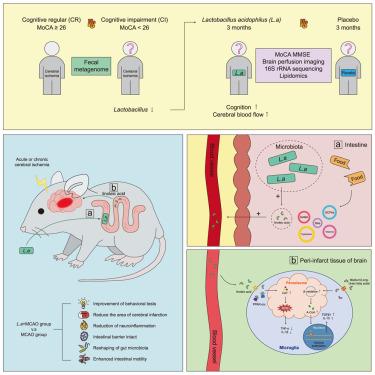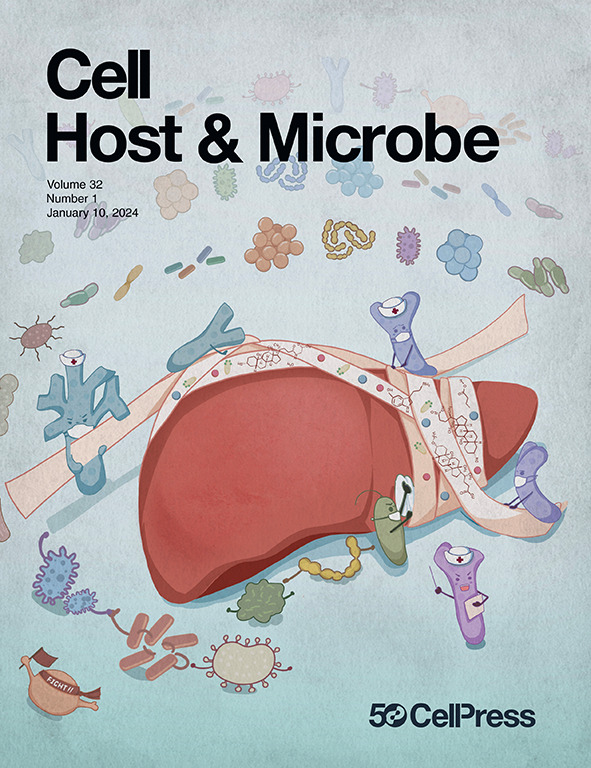Lactobacillus acidophilus promotes cognitive function recovery via regulating microglial peroxisomal function in cerebral ischemia
IF 18.7
1区 医学
Q1 MICROBIOLOGY
引用次数: 0
Abstract
Cerebral ischemia causes significant mortality and is accompanied by inflammatory reactions that exacerbate damage. While the gut microbiota is linked to clinical outcomes, specific treatments and mechanisms remain unclear. Our metagenomics linked low Lactobacillus abundance to cognitive decline in patients with cerebral ischemia. L. acidophilus supplementation alleviated post-ischemic deficits in murine middle cerebral artery occlusion and bilateral carotid artery stenosis models. The neuroprotective effects of L. acidophilus were driven by enhanced gut absorption of linoleic acid (LinA). L. acidophilus-induced LinA activates peroxisomes in microglia, triggering microglial reprogramming to an anti-inflammatory state via reactive oxygen species (ROS) scavenging and β-oxidation-mediated epigenetic changes. These L. acidophilus-driven effects are lost upon dietary deficits in LinA, microglia depletion, or peroxisome disruption. A randomized clinical trial showed that L. acidophilus improved cognition and cerebral blood flow in ischemic patients. This study was registered at ClinicalTrials.gov (NCT05845983). Collectively, these findings reveal a therapeutic axis whereby L. acidophilus drives microglial reprogramming, providing a basis for microbiome-targeted neurotherapies.

嗜酸乳杆菌通过调节脑缺血小胶质过氧化物酶体功能促进认知功能恢复
脑缺血导致严重的死亡率,并伴有加重损伤的炎症反应。虽然肠道菌群与临床结果有关,但具体的治疗方法和机制尚不清楚。我们的宏基因组学将低乳酸杆菌丰度与脑缺血患者的认知能力下降联系起来。补充嗜酸乳杆菌可减轻小鼠大脑中动脉闭塞和双侧颈动脉狭窄模型的缺血后缺陷。嗜酸乳杆菌的神经保护作用是通过增强肠道对亚油酸(LinA)的吸收来驱动的。嗜酸乳杆菌诱导的LinA激活小胶质细胞中的过氧化物酶体,通过活性氧(ROS)清除和β-氧化介导的表观遗传变化触发小胶质细胞重编程至抗炎状态。这些嗜酸乳杆菌驱动的影响在LinA,小胶质细胞耗损或过氧化物酶体破坏的饮食缺陷中丢失。一项随机临床试验表明,嗜酸乳杆菌可改善缺血性患者的认知和脑血流量。本研究已在ClinicalTrials.gov注册(NCT05845983)。总的来说,这些发现揭示了嗜酸乳杆菌驱动小胶质细胞重编程的治疗轴,为微生物组靶向神经治疗提供了基础。
本文章由计算机程序翻译,如有差异,请以英文原文为准。
求助全文
约1分钟内获得全文
求助全文
来源期刊

Cell host & microbe
生物-微生物学
CiteScore
45.10
自引率
1.70%
发文量
201
审稿时长
4-8 weeks
期刊介绍:
Cell Host & Microbe is a scientific journal that was launched in March 2007. The journal aims to provide a platform for scientists to exchange ideas and concepts related to the study of microbes and their interaction with host organisms at a molecular, cellular, and immune level. It publishes novel findings on a wide range of microorganisms including bacteria, fungi, parasites, and viruses. The journal focuses on the interface between the microbe and its host, whether the host is a vertebrate, invertebrate, or plant, and whether the microbe is pathogenic, non-pathogenic, or commensal. The integrated study of microbes and their interactions with each other, their host, and the cellular environment they inhabit is a unifying theme of the journal. The published work in Cell Host & Microbe is expected to be of exceptional significance within its field and also of interest to researchers in other areas. In addition to primary research articles, the journal features expert analysis, commentary, and reviews on current topics of interest in the field.
 求助内容:
求助内容: 应助结果提醒方式:
应助结果提醒方式:


